Human Capital
Our Approach to Human Capital
Centered on its purpose of "Pioneering solutions together for a healthy planet," the Teijin Group is pursuing its long-term vision of becoming "a company that supports the society of the future." To realize this vision, we have renewed our recognition that in order to steadily advance our management and business strategies, it is essential to enhance our human capital and create an environment that enables our talent to thrive. In addition to the talent who form the backbone of our business in areas such as manufacturing and development, it is urgent to secure and develop talent capable of creating value globally, as well as talent who can flexibly adapt to our changing business portfolio and spearhead challenges and innovation. The Company has formulated an HR strategy that includes creating an organization and environment where such talent can maximize their abilities. Through the steady implementation of this strategy, we aim to achieve a sustainable increase in our corporate value.
Our Approach to Human Capital
The Teijin Group positions our human resources as the ultimate management resource.
- The Teijin Group supports its diverse employees in forging their own careers by maintaining an attractive work environment, enabling them to achieve personal growth and a fulfilling life.
- The growth of our business depends on the development and deployment of the capabilities of organizations and human resources. To achieve this, we will strive to assign the right people to the right positions through a series of human resource measures covering organizational design, recruitment, deployment, HR development, evaluation, and treatment.
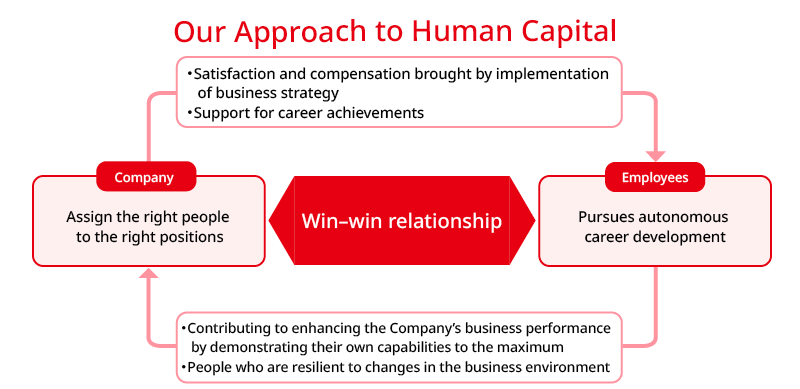
Governance
The Teijin Group holds the Group Human Resource/D&I Committee with the participation of the full executive officer team (15 times in FY2024) to share updates on the progress of discussions regarding succession plans for executive positions and other important positions at the global level, consider individual assignments, and discuss executive management development and training programs. Also, among matters concerning personnel affairs and talent development, including issues related to human capital and diversity, those of particular importance are reported to the Management Committee and the Board of Directors. These activities are promoted under the oversight of the CHRO and in cooperation with the head of the Personnel Division and the general personnel manager of each business unit at Group companies in Japan.
Human Resource Strategy
From both the perspective of our Purpose and as a strategic axis for realizing the Medium-Term Management Plan, we examined what the optimal state for our "organization" and "human resources" would be. Based on the gap between our vision and the current situation, we defined the two main pillars of our human resource strategy as: assigning the right people to the right positions to implement strategies, and implementing measures to enable talent to thrive.
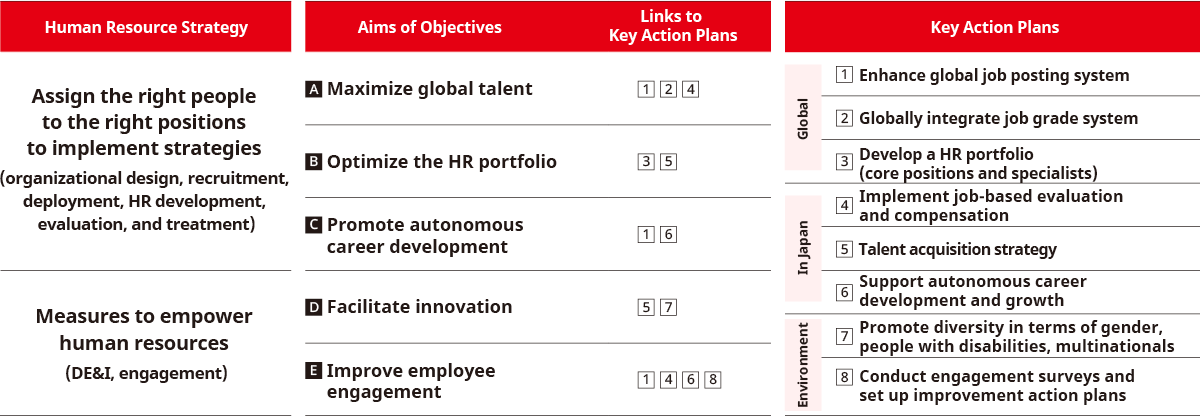
The Right People to the Right Positions to Implement Strategies
Expanding Global Job Postings System
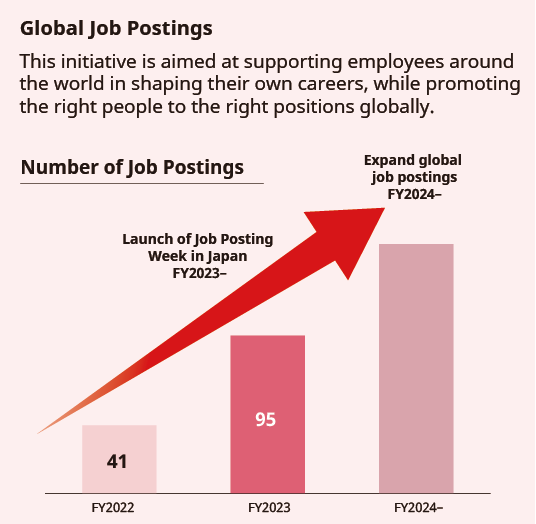
To create an environment where employees can autonomously build global careers and to promote the right people to the right positions, we are rolling out an in-house job application system (job posting system) globally. In FY2024, there were six applications from Japan, Europe, the United States, and Asia for four positions in Japan and the Netherlands. Although no candidates were hired due to insufficient matching with job content, expected roles, and working conditions, we will continue to provide global opportunities for autonomous career development.In Japan, the in-house job application "Job Challenge System" was introduced in the 1990s. Since FY2023, we have also held a "Job Posting Week*" to increase awareness of in-house career opportunities and to encourage employees to apply for internal jobs. During this event, the heads of the recruiting departments introduce their workplaces and job content through online briefings, which provides opportunities for interactive communication with participants. In FY2024, the number of postings reached 105 (95 in FY2023) across Japan and globally. In FY2025, we will focus on establishing and expanding the global job posting system.
- *Coinciding with the application period for Job Challenge, our in-house job posting system in Japan, the heads of participating organizations introduce the Teijin Group's workplaces, job descriptions, and the advantages of working there, while giving employees the opportunity to ask them questions directly. A key feature is the interactive communication it enables. In 2023, the event was held over six days in a hybrid format, combining both in-person and online sessions. Since fiscal 2024, it has been held twice a year online.
Developing a Career through Job Posting System
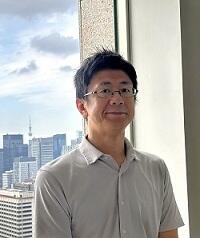
T・F
Business Planning Group, Regenerative Medicine Business Strategy Department, Regenerative Medicine & Implantable Medical Device Division, New Business Development Unit
(Recruitment: September 2023 - Appointment: July 2024)
I learned about Job Posting Week when I was looking for a new area where I could make use of my past experience. Because this event enabled me to understand the atmosphere at each workplace, subsequent communication went smoothly. At present, while taking advantage of my experience in business planning, logistics, and sales, I feel I am able to grow. I also handle many overseas companies, which makes my work rewarding every day, and in the future I envision a career path where I will be stationed overseas to further rise the ranks.
Free agent system
The Free Agent System allows employees to disclose their skills and experience to the business in which they prefer to work, and are then considered for a transfer to that business. Offered in conjunction with the Job Challenge System, the Free Agent System helps support the autonomous career development of employees.
Globally Integrating the Job Grade System
In FY2024, we examined the optimal organizational structure for each business in order to accelerate the realization of our business strategies. From FY2025 onward, in addition to steadily implementing the organizational changes that have been designed, we will set common grades across global operations for major companies in Japan and overseas in order to align job grades for managers and above. Through this initiative, we aim to improve the mobility of human resources.
Formulating the Human Resource Portfolio (Core Positions, Specialists)
In FY2024, we placed particular emphasis on strengthening core positions. For executive positions, each executive prepares a succession plan that is then updated through a three-way meeting with the CEO and CHRO. Discussions are also held on the possibility of external recruitment and the strategic placement of internal successors, and efforts are being made to accelerate the development of candidates up to the time of appointment. As for the required number of successor candidates, which is set at five to seven per core position, the coverage ratio (successor coverage ratio*) improved from 74% in FY2023 to 84% in FY2024.
- *This is calculated as the number of candidates ÷ (number of positions × number of required candidates per position [maximum of seven]). For example, for an executive position, up to seven successor candidates are designated. A full seven candidates represents 100%, while six candidates would correspond to 86%.
Talent pool and core talent development program
Centered around key candidates, we have established a talent pool called the TMSP (Top Management Successor Pool). This pool is reviewed annually, and promising candidates are identified for each position, with strategic placement and development carried out in a focused manner. The placement and development program for these candidates is known as STRETCH Advanced, a multifaceted and practical program designed to foster the next generation of management leaders. The program is structured into three phases: diagnosis, confirmation, and capability development. In line with the capability development areas identified during the diagnostic phase, individualized programs are implemented to accelerate the development of core talent. We are also implementing a program called "JuMP" (Junior Management Program), which selects top-performing employees from across our businesses to develop them into candidates for managerial positions at or above the core department general manager level.
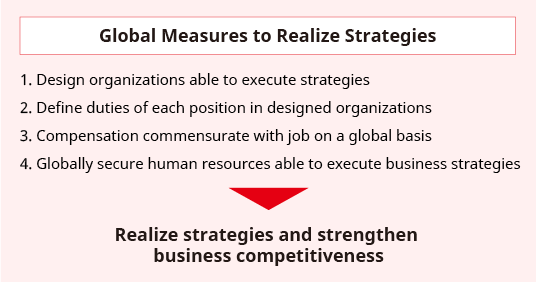
Realizing Job-Based Evaluation and Treatment on a Global Scale
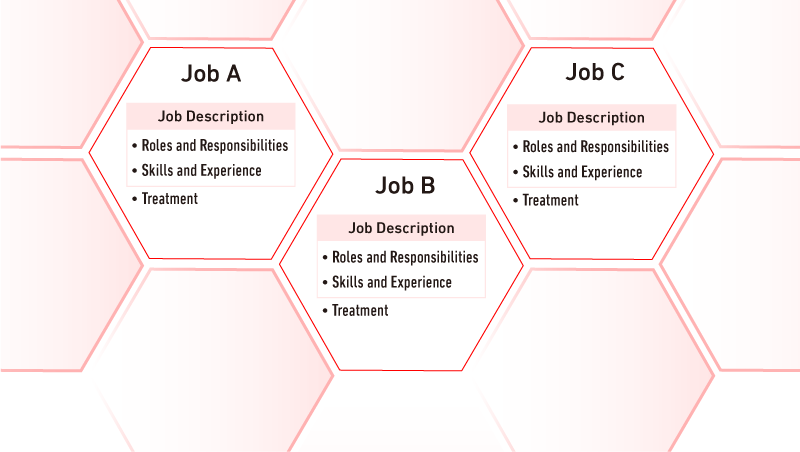
In Japan, in April 2023 we introduced a job-based human resource and evaluation system for executives that clearly links the roles and responsibilities of each position with treatment. Subsequently, in April 2024, we moved division general managers and above to a treatment system that determines compensation based on the scope, complexity, and level of the role's responsibility. During FY2024, we expanded preparations to extend this system to managers at levels below department general manager, and full implementation began in April 2025. By clarifying the duties of each position and ensuring that treatment reflects the job content, we aim to strengthen our ability to attract top talent, promote assigning the right people to the right positions, and accelerate tailored HR development.
Securing the Optimal Human Resources for Each Organization and Position
To achieve our management and business strategies and to enhance business competitiveness, we must acquire highly skilled and experienced specialists who can make an immediate impact. In addition, securing talent with diverse backgrounds promotes organizational diversity, broadens perspectives, and contributes to improved efficiency and innovation.
Recruitment and Retention Status
| Item | FY2023 | FY2024 |
|---|---|---|
| Mid-career recruitment ratio | 40.9% | 59.8% |
| Voluntary turnover rate | 2.5% | 1.7% |
| Three-year retention rate for new graduates (career-oriented) | 92.2% | 91.7% |
- *Teijin Limited and Teijin Pharma Limited
Supporting Autonomous Career Development and Growth
①Support for career development
In FY2024, we carried out training for managers (interviewers) on how to conduct effective career interviews. From FY2025, we will launch a career interview system that provides employees and their supervisors with opportunities to discuss career development. We have also established mechanisms and programs that enable employees to take ownership of their own career development, including the introduction of Optional Online Training available on demand, ranging from skills acquisition to leadership development. Going forward, we will continue to provide support for employees' autonomous career development and growth.
②Basic approach to human resource development and training
The Teijin Group promotes and encourages self-development based on the independent study of each and every employee and coordinates on-the-job training, a job rotation/appointment system, and other training programs as part of a systematic approach to developing Group human resources.
People Development Results (FY2024)
| Education cost | 287 million yen |
| Education time | 37,417 hours in total |
| Educated employee | 813 in total |
- *Teijin Limited and Teijin Pharma Limited
- *Limited to training under the jurisdiction of the Human Resources Development Section
Basic Approach to Human Resource Development and Training
A fundamental part of human resource development is to promote and encourage self-development based on the independent study of each and every employee.
- 1.On-the-job training
A means for leaders to promote the self-development/study of each team member through individual training and guidance in the course of daily work. This supports the growth of each employee based on the feeling of fulfillment/achievement attained through having a sense of urgency in relation to work and through the process of completing work.
- 2.Job rotation/appointment
An opportunity for each individual to develop/extend capabilities and a means to encourage further self-development/study. Leaders should have a good understanding of the strengths and personalities of team members and work to implement appropriate job rotation/appointments based on information gained through interviews with team members.
- 3.Training
This refers to off-the-job training, which is a means to provide employees with content based on requirements for present and future execution of duties and management needs, and an opportunity to provide each individual with a chance for self-development/study. Leaders should proactively send team members to training in order to encourage wider outlooks and mutual development with other employees within and outside the Group.
- 4.Career development and 360-degree evaluation
Company employees and supervisors have meetings on career paths, with supervisors conducting career development activities for employees once a year. Furthermore, in order to encourage employees' own awareness, a 360-degree evaluation is conducted targeting all management employees. The results of the personnel evaluation are conveyed as feedback by supervisors to the concerned personnel, and guidance and advice that will lead to the growth of employees is provided. If one is not satisfied with the results of the personnel evaluation, they can use the self-application system and directly report independently to the Human Resources Department.
③Development and training programs
◆DX Talent Development
Because the Teijin Group considers human resource development to be an important strategic issue for driving autonomous DX, it has formulated a DX Talent Development Roadmap and DX Talent Career Path based on its own unique definitions of DX talent, with the aim of cultivating more advanced DX talent.
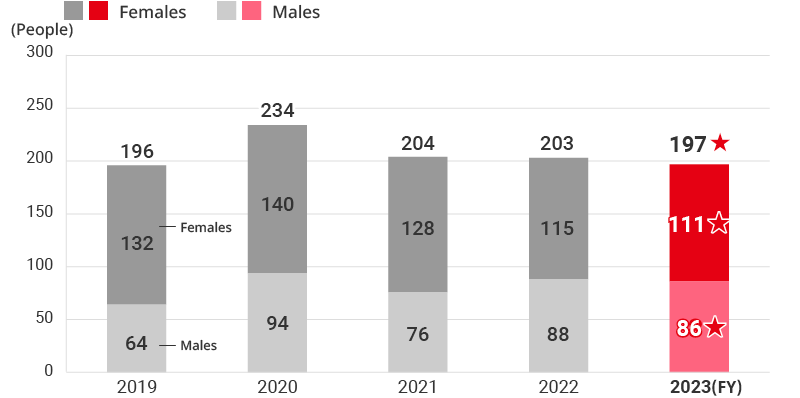
We have been committed to providing introductory DX education since FY2023, offering a digital literacy course to raise the digital literacy level of our global employees. We also offer a manager course aimed at managers to develop decision-making skills, and an advanced course aimed at top-performing students from the literacy course to develop planning skills for DX projects. In FY2025, we will start a program to train "business architects," which offers intermediate training for employees selected from each business unit, aimed at developing their ability to solve business challenges using digital technology.
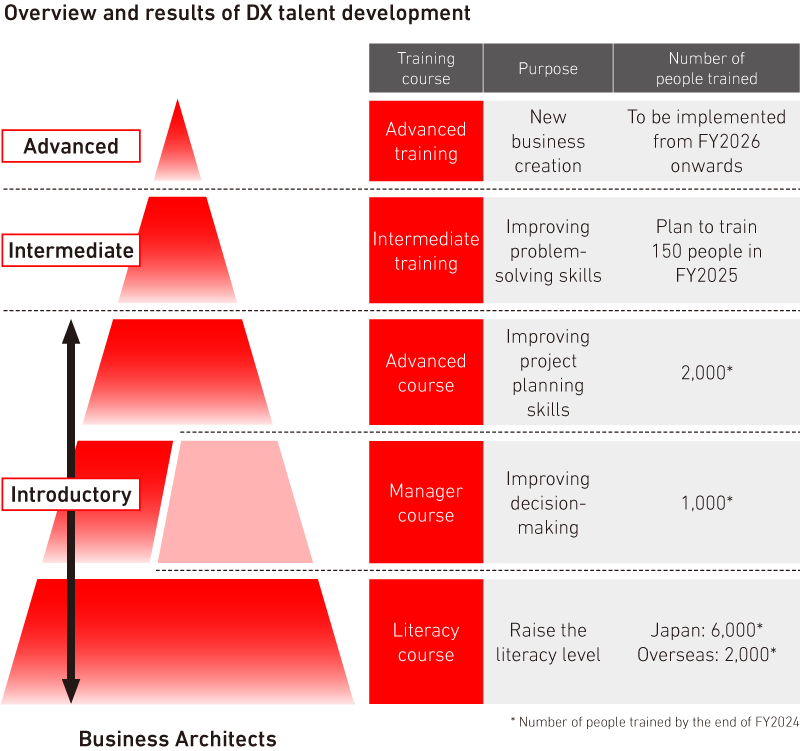
◆New Employee Tutor System
After new employees are assigned to their departments, a young senior employee, known as a "tutor," is appointed to each new employee to provide support. In addition to helping them learn their job duties, tutors also provide advice and follow-up through regular meetings to encourage the new employees' autonomous growth.
◆Leadership and Career Training for Female Employees
As part of our leadership and career development initiatives for women, since fiscal 2024, we have been implementing a mentoring program for female employees featuring external mentors. This program is designed to broaden their perspectives and foster greater professional awareness.
◆Overseas Practical Training System
This system is designed to help young employees build their professional networks. It allows them to gain practical experience at overseas Group companies, thereby deepening their awareness and understanding of different cultural backgrounds, customs, and perspectives, and enhancing their sense of mutual respect.
◆Career Change Support System (Union Members Only)
This system aims to support the lifelong career planning of employees who choose to retire before the mandatory age to pursue new employment opportunities. In addition to the standard lump-sum payment and pension for voluntary retirement, employees receive a special additional payment. The system also allows them to designate a "career transition preparatory period" for the purpose of acquiring the knowledge and skills that will be useful in their new career and making other necessary arrangements.
◆Other Programs
We are working to promote the professional networks of employees both inside and outside the company by offering a variety of programs. These include a "Venture Secondment System" to encourage cross-boundary learning and foster a stronger results-oriented mindset; a "Pro Bono Program" that allows employees to leverage their professional knowledge and experience to contribute to society while remaining with the company; and "Internal Impromptu Meetings" aimed at fostering internal networking.
④Performance appraisal system
Under our Management by Objectives (MBO) system, supervisors clearly present their organization's goals and policies once every six months. Based on these, employees set their own goals, taking into account the expected role of their job grade and position within the organization. After six months, they are evaluated on their performance based on "how they approached their objectives and what results they achieved." This evaluation is then reflected in their bonuses, salary increases, and promotions. Furthermore, each employee receives feedback on their evaluation from their supervisor during a one-on-one meeting. The company also conducts a multi-faceted observational evaluation (360-Degree Feedback Program) for all managers once every two years. Managers utilize the evaluations and direct feedback from these multiple sources to enhance their own management practices.
Measures to Empower Human Resources
It is essential that the diverse employees around the world who come to work together for the Teijin Group can fully leverage their abilities and skills, working enthusiastically and effectively. To create an environment where employees can thrive, we are advancing initiatives with regard to the promotion of DE&I and enhancement of employee engagement.
1) Promotion of DE&I
The Teijin Group has maintained the belief that making full use of the abilities of diverse human resources helps enhance its creativity and promote innovation. Based on this belief, in 2000 we established an organization specializing in promoting the advancement of women via a top-down approach. Since then, we have widened the scope of our efforts to include themes such as nationalities, disabilities, and LGBTQ+, as we work to foster a corporate culture in which diverse human resources can play an active role. As our business has become globalized, we have expanded these initiatives outside of Japan and set up KPIs aimed at promoting diversity in the ranks of executive officers. Furthermore, while we have previously promoted diversity and inclusion, we now recognize that the backgrounds and needs of our employees are becoming even more varied. Moving forward, we will also consider and implement measures from the perspective of "equity"--creating a fair foundation and providing individualized support--to ensure that each and every person can perform to their full potential.
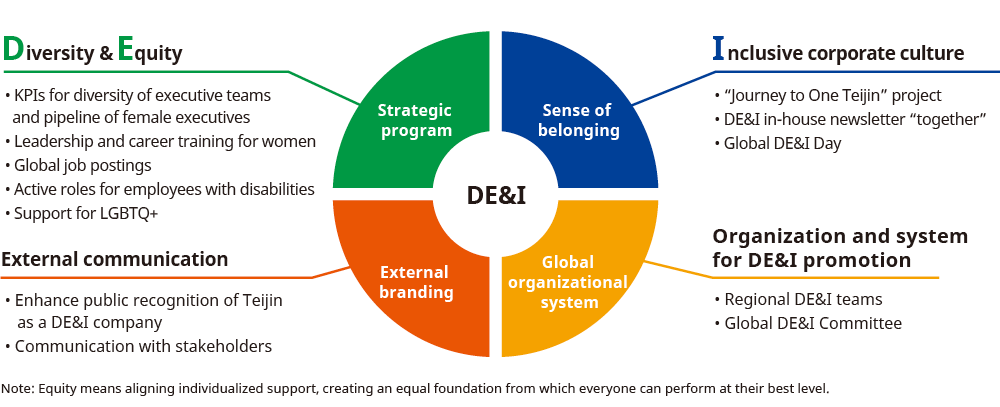
①Action plan based on Act on Promotion of Women's Participation and Advancement in the Workplace and Promotion of Women's Empowerment
In 2000, the Teijin Group established an organization specializing in promoting the advancement of women. Since then, we have rolled out a broad range of initiatives from both a structural perspective, such as enhancing support systems for balancing childcare and work, and a cultural perspective, which includes developing women's awareness toward their careers, promoting training to address unconscious bias, and creating internal and external networking opportunities. Under the new action plan started in FY2024, we are working to build a pipeline for female executives and increase the number of women playing an active role as department or section managers. To that end, we established targets for the ratio of female leaders in each business unit and are working to systematically cultivate and appoint these leaders in our business units.
General employer action plan table based on Act on Promotion of Women's Participation and Advancement in the Workplace
Initiative 1: Build pipeline for female executives
Initiative 2: Cultivate female managers and female candidates for manager positions
Initiative 3: Matchmaking with role models
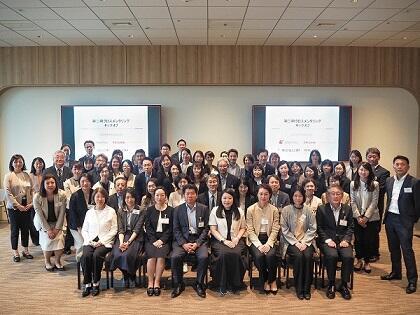
We are focused on cultivating women leaders and facilitating their appointment to higher roles. In Japan, in addition to strengthening the hiring of women and providing support designed to help them successfully continue their careers through various life stages--such as assistance in balancing work with childcare and seminars to improve health literacy--we are also working to enhance career support through mentoring and other initiatives. Starting in fiscal 2024, we have been implementing various programs tailored to different employee levels to help women exercise their own unique leadership styles. For the senior management level, we have introduced a cross-company mentoring program aimed at building a pipeline of future executives. In this program, executives from participating companies mentor female managers from other firms. Through this, the female managers gain direct insights from the senior management of other companies, allowing them to elevate their perspectives, broaden their horizons, and cultivate their career awareness. For the mentors, it is an opportunity to expand the breadth of their own management skills. The program also creates opportunities for participants to interact, which helps foster professional networks both inside and outside the company. For junior managers and those at the pre-managerial level, we provide opportunities for them to broaden their career perspectives and envision their future selves by offering mentoring programs where they can engage with multiple external mentors and participate in joint female leadership training with other companies.
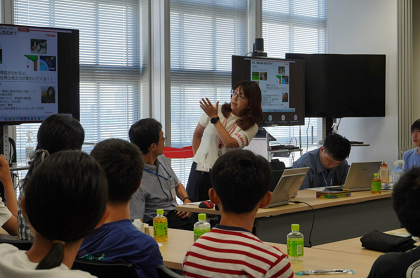
Additionally, as part of our social contribution activities, we have been participating in the Science and Engineering Challenge since fiscal 2021. This initiative, led by the Cabinet Office, was planned to encourage female students to pursue careers in STEM fields. In August 2025, we held an event titled "A World Connected by Radio Waves" at our Osaka Head Office, where over 20 junior high and high school students learned about radio waves and STEM careers. By entrusting the planning and operation of the event to a group of young STEM employees, it has also helped to form internal networks.
Number of Female Employees, Percentage of Female Employees, Percentage of Female Managers, Percentage of Female Executives
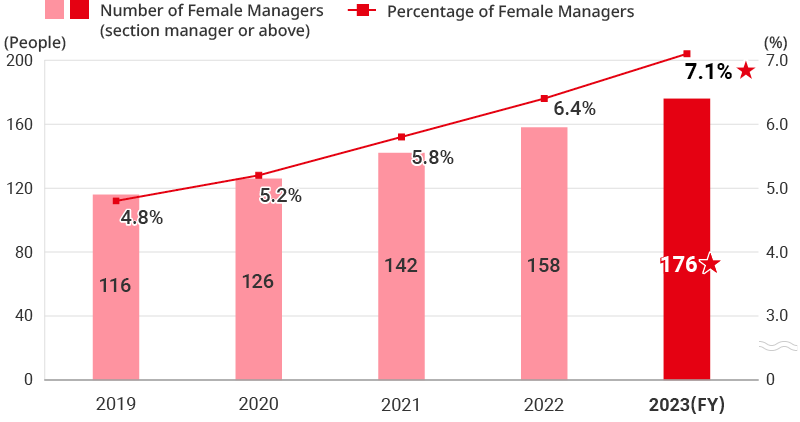
- *Teijin Automotive Technologies NA Holdings Corp. (hereinafter, "TAT-NA"), a consolidated subsidiary in the materials segment that operates the automotive composites business in North America, has been excluded from the scope of aggregation from FY2024 due to it being a discontinued operation. Past figures include TAT-NA, while figures for FY2024 exclude TAT-NA. The figures in parentheses are reference values that include TAT-NA and are not subject to third-party assurance.
- *Figures as of March 31 for each fiscal year (includes employees loaned to companies other than Teijin and its consolidated subsidiaries, excludes employees received from external entities). Figures through FY2022 included number of employees at some equity-method affiliates. From FY2023, figures tabulated only for Teijin and its consolidated subsidiaries. Management positions are at the level of section manager or higher.
Percentage of Male Employees Taking Childcare Leave
The Teijin Group is working to foster a corporate culture in which all employees, regardless of gender, can make use of childcare support systems. In FY2022, Teijin Limited revised its paid leave systems to enable employees to use annual leave they have accumulated during childcare leave, allowing for a maximum of 55 paid leave days for both men and women. We also communicated a message from the CEO encouraging male employees to take childcare leave and made use of our corporate newsletter and intranet to share experiences of men who have taken this leave. The percentage of male employees who took childcare leave in FY2024 was 67.9% .
.
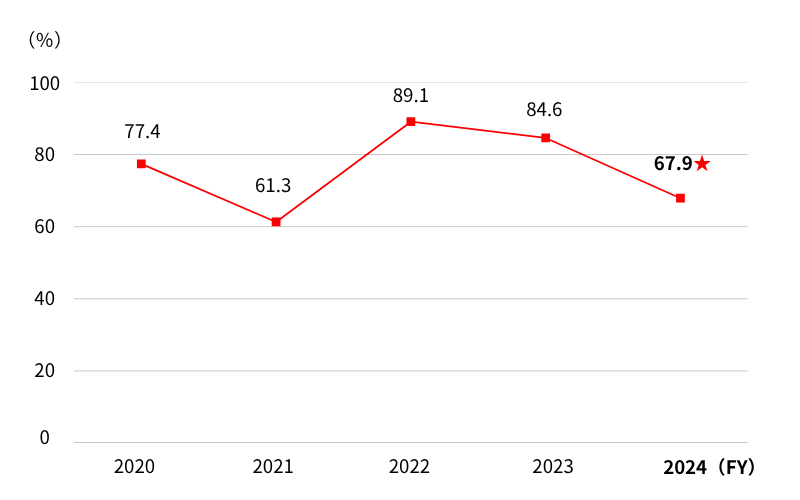
- *Calculated with Article 71-4(i) Ordinance for Enforcement of the Act on Childcare Leave, Caregiver Leave, and Other Measures for the Welfare of Workers Caring for Children or Other Family Members.
- *Teijin Limited and Teijin Pharma Limited
Gender wage gap
Although the Teijin Group does not differentiate wages between men and women in the same rank or position, a survey revealed the following results regarding the gender wage gap. Aside from certain instances, the overall wage gap between male and female employees shrunk compared to previous fiscal years.
| 2023 | 2024 | Year-over-year change | |||||||
|---|---|---|---|---|---|---|---|---|---|
| All | Full-time | Part-time | All | Full-time | Part-time | All | Full-time | Part-time | |
| Teijin Limited | 77.9% | 81.2% | 58.0% | 78.2% |
81.2% |
59.9% |
+0.3% | 0 | +1.9% |
| Teijin Pharma Limited | 47.5% | 70.5% | 31.1% | 49.8% | 71.4% | 37.3% | +2.3% | +0.9% | +6.2% |
- *The total amount of base salary, bonuses, and various allowances (excluding commuting allowance) including overtime pay, but excluding retirement benefits, is calculated. Overseas assignees are excluded from the calculation as their wages are effectively borne by the host country.
We recognize the following as facts regarding the wage gap:
- 1.As the job grade increases, the percentage of women within the same grade decreases. This workforce composition leads to a wage gap between men and women.
- 2.In some cases, there are gender differences in the payment records for various allowances other than the basic salary, and this contributes to the wage gap between men and women.
- 3.Few male employees utilize the short-time work system for childcare or family care, and this contributes to the wage gap between men and women.
While the wage gap is on a downward trend and has stabilized to a certain extent, we will continue to identify its causes, as discovered through the above findings. We will also continue to proactively work toward narrowing the wage gap by systematically cultivating female managers and facilitating their appointment to higher roles, improving gender awareness, and exploring further potential revisions to our human resources systems.
②Promoting the employment of people with disabilities
The social participation and economic independence of persons with disabilities are vital for realizing a diverse and inclusive society. At our special subsidiary, Teijin Soleil Co., Ltd., we primarily employ individuals with intellectual, developmental, and mental disabilities. We operate an office support business (administrative assistance, cleaning) and an agriculture business (production and sale of organic vegetables, edible roses, and Phalaenopsis orchids) that create opportunities for individuals with disabilities to thrive according to their individual characteristics. By enabling them to demonstrate their abilities in agriculture despite their disabilities, we aim to foster a workplace where they not only contribute to the business, but also find a sense of purpose and pride in being active members of society and contributors to the economy. Teijin Soleil Co., Ltd. is also working to expand sales with the aim of increasing revenue and achieving a recurring profit in its agriculture business.
Teijin Soleil and Phalaenopsis Orchids
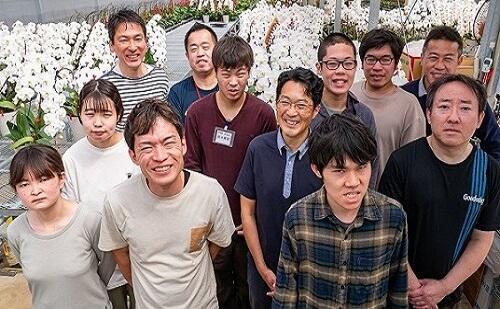
Takayuki Suzuki (Back left of the photo)
Our Phalaenopsis orchid business ships large-flowered orchids. Thanks to the meticulous cultivation and care that leverages the strengths of our employees with disabilities, these orchids are traded at prices that are about 20% higher than the market average. Major corporations have become repeat customers, using our orchids for celebratory gifts for newly appointed company presidents and other occasions. The flower language of the phalaenopsis orchid is "happiness flies to you," and it is often chosen as a gift to express one's feelings toward someone on important occasions in life. A young man in his twenties with developmental disabilities joined our company after graduating from a special-needs high school. When he presented a three-stem phalaenopsis orchid, which he had carefully nurtured, to his grandmother, she was so moved with joy that she burst into tears. Every person has something they excel at. Among people with disabilities, some have rich sensitivity or exceptional concentration. At our company, we embrace the conviction of "providing high quality precisely because of disabilities," making the most of such strengths. We believe that drawing out the potential of people with disabilities and offering them opportunities to build a positive future is a truly meaningful endeavor.
As of March 2025, the employment rate for persons with disabilities at Teijin Limited, Teijin Pharma Limited, Teijin Healthcare Limited, and Teijin Soleil Co., Ltd. was a combined 2.86%, exceeding the legal requirement of 2.5% (as of March 2025). In FY2021, the company received the Challenge Award at the Noufuku Award, a first for a special subsidiary, and in FY2023, it obtained the Monisu certification.
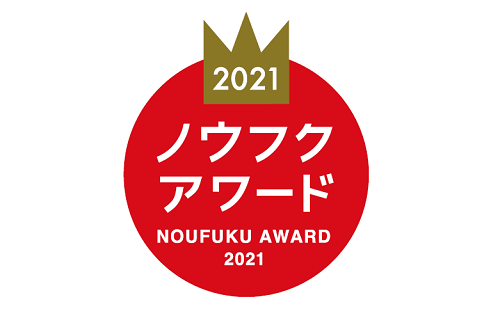
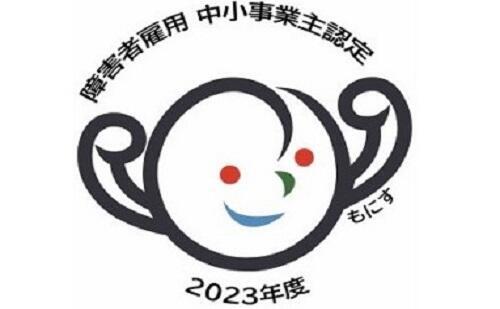
③Promoting efforts to support LGBTQ+ employees
To support the success of our LGBTQ+ employees, since 2017, we have implemented four key initiatives: (1) clearly stating the company's policy, (2) raising employee awareness, (3) revising HR and payroll systems to accommodate LGBTQ+ individuals, and (4) providing support for LGBTQ+ individuals. We place a particular emphasis on raising awareness and providing individual support. We have conducted events to foster an understanding of the experiences and thoughts of LGBTQ+ individuals, as well as training sessions by employee level to deepen the understanding of LGBTQ+ topics. We also respond individually to consultations from our LGBTQ+ employees.
④Rolling out measures to enhance awareness of DE&I
To strongly promote our business activities globally, it is essential to make full use of the abilities of diverse human resources who differ in nationality, race, gender, sense of values, ideas, and experience. The Teijin Group upholds "Fostering growth through diversity and expertise" as one of its three Values, and accordingly has put in place a work environment in which every Group member can fully harness their individuality and attractiveness to make the most of their abilities. Since 2002, we have issued a pamphlet entitled "together" to raise awareness of DE&I every year. Starting with the 2020 version, we have prepared English and Chinese versions, in addition to the Japanese version, so that it can be distributed to all Group employees. In FY2023, we included a discussion between the CEO and female outside directors titled "Why Does Teijin Need to Foster D&I? Reaffirming the importance of leveraging diverse human resources." In addition, the message from the CEO reiterates the necessity of promoting DE&I in building a resilient organization and realizing our long-term vision. In the latest fiscal 2024 issue, our CHRO and employees held a dialogue on the theme of "Toward an Era of Career Autonomy: Our Choices for Surviving a Period of Transformation." In the message from leadership, we took the opportunity to clearly reiterate our philosophy on diverse career choices, the need to increase talent mobility, and the importance of building one's career autonomously.
2) Improving Engagement
Achieving our business strategies requires building a highly engaged organization where each employee empathizes with the company's philosophy and works proactively. For this reason, the Teijin Group conducts an annual engagement survey across the entire Group and works to improve engagement with a strong awareness of "One Teijin."In FY2024, the survey was conducted with approximately 19,500 Group employees in Japan and overseas (response rate: 76%), and the overall score reached 64, an increase of two points from the previous year. Scores improved or were maintained across all questions, businesses, and regions, showing an overall improvement in employee engagement. One of the key drivers of improved Group-wide engagement has been "communication." To this end, we regularly provide opportunities for employees to share their ideas and aspirations through initiatives such as town hall meetings and purpose workshops.
| FY2021 | FY2022 | FY2023 | FY2024 | |
|---|---|---|---|---|
| Engagement score | 64 | 64 | 62 | 64 |
| Response rate (%) | 70 | 68 | 71 | 76 |
[Case Study]: Data-Driven Initiatives Using AI
Since fiscal 2024, we have been collaborating with the DX Promotion Department to enhance our support for improving engagement through a data-driven approach that utilizes AI. The results of our surveys are visualized on a dashboard and published to employees on our intranet, while executives can view the results for each business and division at a glance. In some business divisions, we are experimentally using AI to analyze paid leave utilization rates, overtime hours, and qualitative comments to present recommended actions. By visualizing the positive correlation between the "taking action" score calculated from survey results and the engagement score, we enable each organization to implement improvement actions with a greater sense of buy-in.
KPIs related to human capital
To measure the effectiveness of measures to empower human resources, a central aspect of our human resource strategy, we have established indicators related to the diversity of executive officers and managers, as well as employee engagement. Through systematic training and promotions, we aim to improve diversity among executive officers and managers, and by setting and carrying out engagement improvement actions, we strive to achieve our targets for enhancing employee engagement.
KPIs related to diversity
| Results as of October 2023 | Results as of October 2024 | Milestone as of April 2026 |
Target for April 2030 |
||
|---|---|---|---|---|---|
| Executive officers*1 | Women | 12% | 20% | 20% | 30% |
| Non-Japanese nationals | 8% | 8% | 10% | 30% | |
| Managers*2 | Female department and section managers | 10% | 11% | 12% | 20% |
KPIs related to employee engagement
| Results as of September 2023 | Results as of September 2024 | Milestone as of April 2026*3 |
Target for April 2030*3 |
|
|---|---|---|---|---|
| Employee engagement score | 62 | 64 | 64 | 68 |
- *1Directors and Statutory Auditors (from June 2025 onward, Audit & Supervisory Committee Members), and Group Corporate Officers
- *2Line managers in global positions, including Japan
- *3Refers to the survey conducted in September of the previous year
Workstyles
Comfortable Work Environment
Status of the work-from-home system
In FY2019, Teijin and Teijin Pharma introduced telework programs that allow employees to work outside the office even in the absence of a reason such as childcare or family care. Since FY2020, we have been expanding these telework programs as a temporary measure to prevent the spread of COVID-19 infections. However, at the moment, we have established limits on teleworking hours for each business unit based on the type of work done, as we continue to strive to realize flexible and diverse workstyles. Looking ahead, we will effectively combine the telework system with actual face-to-face communication in the workplace to enhance the productivity of the organization while increasing workstyle flexibility. By doing so, we will work to enhance this system so as to ensure that all employees can demonstrate their capabilities to the greatest extent possible.
Management of overtime hours/actual working hours
We believe that enabling employees to work in a healthy environment, free from physical and mental stress, is the driving force that supports the company's sustainable growth. For this reason, we are committed to health and productivity management, and have been certified as a Certified Health & Productivity Management Outstanding Organizations Recognition Program for nine consecutive years. In particular, to maintain the mental and physical well-being of our employees, we encourage the planned use of annual paid leave, strictly enforce advance applications for overtime work, and have introduced "No Overtime Days" to ensure appropriate working hours. Furthermore, we are working to standardize and streamline operations through the use of RPA*. We also provide flexible workstyles such as teleworking, flextime, and shorter working hours, enabling employees to balance their work and personal lives according to their individual circumstances and life stages. In this way, we are fostering an environment in which employees can maintain a better work-life balance, free from restrictions of time and place.
- *Robotic Process Automation
Encouragement of paid annual leave
Employees in their first year of employment are entitled to 15 days of paid annual leave. After the first year, one additional day is granted for each year of service, up to a maximum of 20 days per year. Employees can carry over up to 40 days to the following year. To promote work-life balance and reduce total working hours through planned use of paid annual leave, we designate specific days each year to encourage taking paid annual leave.
Workstyle-related Indicators*1
| FY2023 | FY2024 | |
|---|---|---|
| Average monthly overtime hours*2 | 13.3h | 13.2h |
| Annual paid leave utilization rate | 75% | 76% |
- *1Teijin Limited and Teijin Pharma Limited
- *2Non-managerial employees (career-oriented and clerical positions)
Balancing Work with Individual Life Events
Support for balancing work with childcare
Since establishing the Office to Promote Women's Advancement in 2000, we have continued to promote efforts to help our employees balance their work with childcare. Specifically, we have been working to design flexible and diverse systems that make it easier for employees, regardless of gender, to work while raising children, including by enabling the reduced hours work system to be used until the end of the fiscal year in which an employee's child reaches third grade in elementary school, offering wage compensation during childcare leave by allowing the utilization of accumulated paid leave, and providing allowances for babysitter expenses. We have also created manuals for the management of such systems and have worked to promote understanding in the workplace, including among supervisors, and ensure smooth communication. In our action plan based on the Act on Advancement of Measures to Support Raising Next-Generation Children, which was updated in FY2024, we lay out the following targets as we align our focus on creating environments where each employee can work with greater enthusiasm while balancing their work with childcare. Furthermore, in preparation for instances where a parent, primarily in urban areas, cannot find a daycare center due to lack of availability and therefore unable to return to work when planned, we provide support for employees on childcare leave so they can find alternative daycare facilities. By providing a special assistant to such employees, we ensure that they can return to work more smoothly.
Target 1: Create an environment that supports autonomous career development for employees returning after giving birth
Target 2: Increase opportunities for men to participate in raising children
Target 3: Promote workstyle reforms so that employees raising children can realize a work-life balance
Support for balancing work with nursing care
Cases of employees providing nursing care for their parents are expected to increase in the future, as Japan's declining birthrate and aging population progress. Ensuring that these employees can balance work with providing nursing care for their family members has become an important issue. To that end, we have established systems that give consideration to the unpredictable nature of nursing care in terms of the necessary time and duration. For example, employees can make use of the reduced working hours system as many times as they need as long as they are providing nursing care. In this way, we have set up an environment where employees can continue to work with peace of mind while providing nursing care. We also provide support from a cultural perspective, including holding seminars to promote knowledge of nursing care and understanding of our nursing care systems, setting up a consultation desk that employees can seek consultation on issues they face in providing nursing care, and launching Wakaru Kaigo Biz, a service that provides information on nursing care that can be viewed at any time.
Support for balancing work with personal illness
We have introduced a reduced working hours system for employees dealing with a personal illness. Through this system and other efforts, we support employees in balancing work and medical treatment, including employees diagnosed with cancer and those undergoing fertility treatments. Furthermore, although separate from personal illnesses, we held a seminar on women's health in FY2023, as we did in FY2022, with the aim of having male employees better understand women's health issues, such as the physical and emotional uneasiness that occurs during menstruation. We also are working to enhance literacy of women's health within our training for newly appointed managers.
Other Support Systems and Welfare Benefits
To create a workplace with vibrant employees and a dynamic atmosphere, we offer various support systems and non-statutory welfare benefits that employees can use according to their needs.
Various measures to support asset formation
These include property accumulation savings, housing loans, an employee stock ownership plan, and a retirement pension.
Cafeteria-Style benefits plan (Select plan)
This system allows employees to personally consider, select, and use benefits that meet their own needs from a variety of options within a pre-allotted, point-based subsidy framework.
System to support qualification acquisition
The company provides support to employees who take and pass exams for qualifications that are useful in their duties, contribute to the company's credibility, or aid in their own professional development.
Hello-Again system
The Hello-Again System allows former employees who left the Teijin Group due to personal reasons such as marriage, child-rearing, or caregiving to return to the company under certain conditions. This system enables them to continue their careers with the Teijin Group if they meet the certain criteria.
System allowing employees to take leave when spouse is transferred overseas
At Teijin, we have a system that allows employees to take up to three years of leave in the event that their spouse is transferred overseas for work.
Paid leave for volunteer activities
From the perspective of promotion volunteer activities across the Teijin Group, Teijin and Teijin Pharma have introduced a system that enables employees to take paid leave for the purpose of volunteering.
Determining the Status of Groupwide Labor Management
The Teijin Group carries out regular surveys on labor management at Group companies. We identify management issues in our Group personnel management system and implement effective measures as required, particularly from the viewpoint of labor corporate social responsibility (CSR). From the survey, we obtain data on basic labor CSR indicators. After amendments to labor-related laws or if otherwise needed, the Teijin Group reviews the labor management status, employment rules, and personnel systems of all Group companies in Japan. Since labor laws and regulations differ from country to country, with regard to overseas Group companies, we conduct surveys of basic items, and also implement additional surveys on the human resource system and salary systems, as necessary.
Survey items (Group companies in Japan)
Basic labor CSR indicators - Conducted annually
- (1) Number of employees (by position/gender)
- (2) Average years at company and average age (by position/gender)
- (3) Number of newly recruited employees (by position/gender/career stage (new versus mid-career)/type of work (administrative versus technical)
- (4) Number of retired employees (by position/gender/reason)
- (5) Data on re-employment after age-limit retirement (by position/gender)
- (6) Number of executives (by gender/Japanese nationality)
- (7) Number of fixed-term employees (by gender/Japanese nationality/fixed term/OB/part time)
- (8) Use of childcare leave/number of days (average and maximum)/childcare short-time work system (by gender)
- (9) Use of nursing care leave/nursing care short-time work system (by gender)
- (10) Number of employees taking leave for volunteer activities (by gender)
- (11) Number of employees taking nursing care leave (by gender)
- (12) Use of reemployment system for retirees due to family circumstances (by gender)
- (13) Number of employees using teleworking program (by gender)
- (14) Number of foreign workers (by position/nationality/gender/job title/date of hire)
- (15) Number of foreign trainees (technical interns) accepted
- (16) Number of employees seconded overseas (Japanese employees seconded to overseas companies)
- (17) Number of employees posted away from their family (domestically and overseas)
- (18) Gender wage gap (regular, non-regular/by gender/reasons for gap)
- (19) Status of responding to Act on Promotion of Women's Participation and Advancement in the Workplace (submission of action plans/disclosure of items)
Status of labor management - Conducted when required
[Legal compliance]
- (1) Employment of the elderly
- (2) Work hours
- (3) Temporary/Contract workers
- (4) Maternity protection and childcare
- (5) Care and nursing
- (6) Equal-opportunity employment
[Labor affairs measures]
- (1) Work-life balance (e.g., overtime hours/annual paid holidays/flextime system)
- (2) Retirement allowance system
- (3) Progress in promoting diversity
- (4) Recruitment and education
- (5) Health and welfare system (dormitories/other issues)
- (6) Other issues (e.g., existing issues for which demand for support exists)
Survey items (overseas Group companies)
Survey of the following basic labor CSR indicators (by position/gender)
- (1) Number of employees
- (2) Average years at company and average age
- (3) Number of new recruits
- (4) Number of employees who retired
Maintaining Sound Industrial Relationships
The Teijin Group views the labor union as an important stakeholder, and we are working to maintain and improve our good relationship with the union. As fundamental concepts in industrial relations, we emphasize "mutual understanding and thorough prior consultation." With regard to labor-management meetings, Teijin adheres to a comprehensive collective bargaining agreement by which meetings will be called upon request from either the Company or union side. At Group companies in Japan, all employees except directors and managers belong to the labor union. At the Group Labor-Management Council, which brings management and main union officials together, and also at Labor-Management Committee meetings (held as required), members exchange opinions on business as a whole and hold discussions with the aim of improving workplace environments. In addition, when we revise working conditions during the spring season, we hold discussions on a broad range of issues pertaining to human resources, including not only increasing base pay and other compensation but also the ideal direction of our human resource management systems and efforts to secure personnel, develop their capabilities, and enhance their motivation. Labor unions and work councils (joint labor-management councils) have been established in overseas Group companies, and consultations are held between the company and representatives of the employees to achieve a better work environment and working conditions.
Preamble of Labor Agreement between Teijin Limited, Teijin Pharma Limited, Teijin Healthcare Limited and Teijin’s Labor Union (largest labor union of Teijin Group)
Teijin Limited, Teijin Pharma Limited, Teijin Healthcare Limited and Teijin’s labor union mutually respect the position of one another, and work together towards establishing industrial peace through the sound development of business and consideration of union member’s welfare. With this in mind, the Teijin Labor Agreement was concluded, and both sides are committed to observing it in good faith.
- *The labor agreement with Teijin's labor Union is applicable to all full-time and fixed-term employees.

